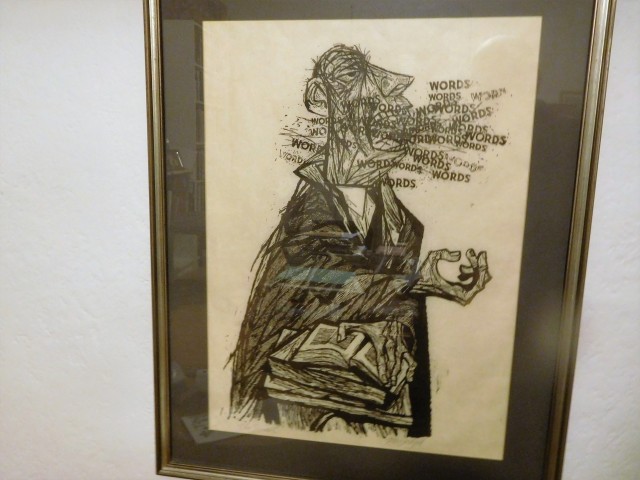Featured image: The super moon, seen from our driveway, early Monday shivering morning, 14 November.
You don’t say #12, Wednesday 16 November 2016–Words. Actions.

Words, actions, words, actions, words—the two are inextricably connected, whether we like it or not.
I am deeply troubled by the words and actions in the campaigning for Election 2016. I’m dismayed by the results and the uncertain prospects of what Abraham Lincoln termed: “Democracy is the government of the people, by the people, for the people.” What I see is more disconnect than positive connection of governing words and actions that will serve all the people.
I am encouraged by columnists such as Leonard Pitts Jr., of the Miami Herald, and that voice of sober reason, Bill Moyers, as well as others.
In “It’s mourning in America,” (The Elkhart Truth, Tuesday, 11/15), Pitts writes, “Donald Trump is president-elect of the United States. God help us all.” He ends the column with, “I wanted to believe that in 2016, demeaning women or being applauded by the KKK would be a bar to high office; I wanted to believe my country was better than that. And it was not.”
Transforming love
Sunday’s worship service at Prairie Street Mennonite Church drew us ever closer to that fragment of sturdy ground we find in Jesus Christ, Jesus the stone that the builders rejected that became the chief cornerstone of Christ’s church. Worship leader Twilla Epp-Stutzman in the call to worship invoked God’s presence to “guide us into the beauty and wonder of your transforming love.”
“Ye shall know the truth and the truth will make you mad.” That’s a quote from Mark Twain. Sadly, some people are suspicious of truth claims or outright reject them.
The Sermon on the Mount spells out life-giving truth claims. Check out Matthew 5:1-16. Here Jesus calls believers to welcome, comfort, esteem, do justice, have mercy, be pure in heart, make peace, endure persecution.
Sara Wenger Shenk preached from the Matthew text, and from Isaiah 52:7-10, her sermon topic chosen weeks ago, “Beauty that saves the world.”
Sara adapted her sermon to account for the traumatizing and disorienting outcome of Election 2016. The text of Isaiah was a word of hope to a devastated people, Your God reigns, just as God reigns in a seriously off-balance country and in the issues dividing the Mennonite Church family.
Sara is president of Anabaptist Mennonite Biblical Seminary, a member of Prairie Street Mennonite Church, and a grandmother—an order she might reverse in importance. Her sermon, at once prophetic and pastoral, should soon be up as a podcast on the Prairie Street Mennonite Church website. Our God reigns!
A novel about a family going to shambles
I just started reading the novel, Here I Am, by Jonathan Safran Foer (Farrar, Straus and Giroux, New York, 2016). Right off the question arises how people so closely connected as a family can find a solid spit of ground to develop their own identities even as their life together appears to go to shambles.
I learned about the book from an interview Gavin Esler did with Safran Foer that appeared on the BBC News Online, 11 November. Happily, our public library had a copy on the New Books shelf.
The novel is about a family that in all their verbal exchange forgot how to communicate with one another. Elser: “Safran Foer explains that he wanted to create a situation in the book where people were forced to ask the question: ‘Where do words end and actions begin, and to what extent are the characters all talk?’”
The “all talk” includes explicit detail of the characters unuttered thoughts and musings as well as the often clever and devious words they resort to.
The flyleaf notes, “Unfolding over four tumultuous weeks in present-day Washington, D.C., Here I Am is the story of a fracturing family in a moment of crisis. As Jacob and Julia Bloch and their three sons are forced to confront the distances between the lives they are living, a catastrophic earthquake sets in motion a quickly escalating conflict in the Middle East. At stake is the meaning of home—and the fundamental question of how much aliveness one can bear.”
Safran Foer comments on how Old Testament Abraham had to cross a bridge of trust when God commanded him to sacrifice his son, Isaac. Abraham responded to God, “Here I am.” When Isaac saw no lamb at hand for the sacrifice—the lamb being the bridge to fulfil God’s order—Abraham responds, “Here I am.”
I like the image of people having to cross an invisible bridge over the morass that is part of life. Each step requires trust, movement forward. Not to cross is not an option, at least it’s not a life-giving option.
I’m only 140 pages into the 571-page novel. The dismal and dismaying lack of communication in all the family’s words and actions, played out in what should be freeing intimacy but is not, boggles the mind. I once read that the opposite of communication is not silence, it’s sin. Oy vey.
Leonard Cohen
Song writer Leonard Cohen died last week. Arwa Halder quoted him in a story in BBC News, 11 November. “There is a crack in everything, that’s how the light gets in.”
There’s a crack in asphalt that lets grass grow. There’s a crack in walls that lets a view of freedom in. There’s a crack in society that lets new ideas in. There’s a crack in a human’s fingers that lets justice in. There’s a crack in the seasons that lets life in. There’s a crack in everything. As Cohen sang, “Halle, Halle, Hallelujah!”
Truth claims from Aesop
Aesop was a slave whose storytelling ability led to his being freed by one of his masters. His fables from ancient Greece help us deal with whatever faces us in life, writes Rochelle Larkin, editor of Great Illustrated Classics: Aesop’s Fables. (Baronet Books, New York, 2000).
Here’s the fable, “The Boasting Traveler.”
A man went on a journey and when he came home he had wonderful tales of his travels in foreign countries. He said in Rhodes, Greece, he had taken part in a jumping-match. He jumped higher than anyone else. “Just go to Rhodes and ask them” he said, “everyone will tell you it’s true.”
But one of the listeners said, “If you can jump as good as that, we needn’t go to Rhodes to prove it. Let’s just imagine this is Rhodes for a minute: and now—jump!”
Deeds, not words.
I’m for deeds. We want to see actions that match a person’s words. If it walks like a duck, talks like a duck, looks like a duck, it’s a duck. Walk the talk. “I’m from Missouri, the Show Me State.” Practice what you preach.
May I show deeds of “Here I am” kindness. May I be forgiven for words—and deeds—that duck kindness, responsibility and truth.
Let’s hear it for words, too
Another fable from Great Illustrated Classics, “The Oxen and the Axle.”
A pair of oxen were drawing a heavily loaded wagon along the highway. As they tugged and strained at the yoke the Axles creaked and groaned terribly. This was too much for the Oxen. They turned around indignantly and said, “You there! Why do you make such a noise when we do all the work?”
They complain most who suffer least.
At the same time as we value actions to validate one’s talk, we need to pay close attention to language. Our words, for better or worse, reveal who we are and where we’re headed. Through language we can both evade the truth or be the truth.
Society uses language to herald one’s space, says Steven Roger Fischer in A History of Language, (Reaktion Books, 2005). Fischer, director of the Institute of Polynesian Languages and Literature in Auckland, New Zealand, writes: “Already ancient Egyptians appreciated that ‘the word is father to the thought’, acknowledging that language is both the foundation and building material of the social house. . . . Multiple levels of social interaction, from international relations to intimate relationships, are borne, enabled and empowered through language.”
Further he says, “Borrowing new words and expanding the domain of old words are linguistic processes which have enriched human society since the emergence of articulate speech.”
The language we use in the 21st century includes words that did not exist some 30 years ago. Just think of “download,” “online,” “Internet,” “modem.” Evolving language has a positive outcome.
The positive does not come without changed perceptions. Fischer notes that words such as “queer,” “cohabitation,” concubine” and other words are “victims of the sexual revolution of the 1960s and 1970s that rendered these terms not only meaningless but offensive. ‘Divorcee’, ‘spinster’ and ‘unwed mother’ have all but disappeared since the 1970s, attesting to women’s changed role in society.”
Fischer: “Sociolinguists also note negative changes. ‘Music’, ‘literature’, ‘art’, and ‘theatre’, are losing their traditional definitions by the mutating appearance of what they embrace; they are ‘dissolving into meaninglessness.’ Perhaps more alarmingly, ‘family’, ‘marriage’, ‘honour’, even ‘God’ are becoming indistinct concepts as society inverts and fails to maintain hitherto revered conventions and beliefs.”
Fischer sees these changes as “a difficult reweaving of the social fabric that is still unfinished. The older one becomes, the more one must abandon inherited usages and redefine venerable concepts. For many it is a difficult, if not impossible, task.”
Our social fabric indeed does need mending. We have the opportunity every day to create a life-giving bridge for ourselves and others to cross. To do otherwise means we help feed the morass of ugliness, cacophony, demonization, dishonor, and stinky and Samaritanless behavior that teems beneath the bridge.
Make way across the life-giving bridge
There’s hope. Someone has said that courage is fear that is saying its prayers. Take courage to strengthen the life-giving bridge. Take courage to cross dangerous, difficult mountains. Take courage to mentor children and youth.
“How beautiful upon the mountains are the feet of the messenger who announces peace, who brings good news, who announces salvation, who says to Zion, ‘Your God reigns.’” (Psalm 52:7)
Sara Wenger Shenk called the church to a today and a tomorrow where we “can and will unite as a church worth its salt and light.”
Words, deeds, words, deeds, united as one. Sing Halleujah; we’re living it. Beauty abounds. Our God reigns. Thanks be to God.
-John
P.S. A time and a place for photos to talk
















How utterly grateful I am to know you, John! This blog is a treasure and a testament to retirement being lived to the fullest!
LikeLike
Thank you, Marcia. Indeed, Robert Browning said, “The best is yet to be.” That’s for the rest of life for which the first was made. For that one needs faith, a sense of humor, and friends old and new. And time for a cup of coffee or tea. Best! -John
LikeLike
Hello John,
Last Sunday at our monthly Song Circle we sang Hallelujah in honor of Leonard Cohen. He has long been a favorite singer of mine and he will be missed. Your post today abounds in beautiful words and transforming love! Ever since we have started subscribing to “It’s About Now” the quality of our life has improved! I’m so glad we were able to share some special time together in early November. I hope you are enjoying the humor that I send out occasionally and we are happily experiencing the richness of your posts and your reflections. The photos you took are breathtaking, from the Super Moon to all of the flowers and colorful leaves. We breathe it all in, pause and say, “Thanks be to God”. Hallelujah!
Monty & Ginger
>
LikeLike
You are too kind, Monty. Thank you all the same! Yes, the humor posts brighten the day. Best to you and Ginger. -John
LikeLike
John some words are important and yours in this blog certainly are. Thank you, thank you.
~ Emilie ~
LikeLike
Thank you, Emilie. Hallelujah! On the lighter side, George Bernard Shaw once said every word he wrote was worth a dollar. Someone wrote him and enclosed a dollar for one of his “worth-a-dollar” words. Shaw replied, “Thanks!”
LikeLike
So well said by camera and pen!
LikeLike
Spotted the picture of our mutual grandfather, Christian Bender.
Glad to see you’re enjoying your retirement!
LikeLike